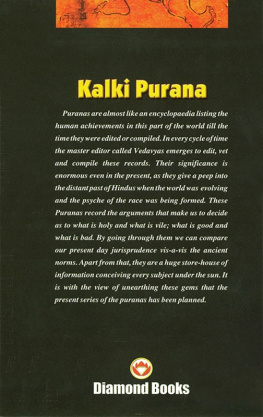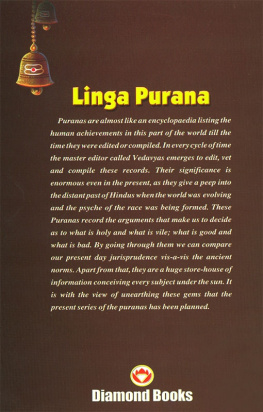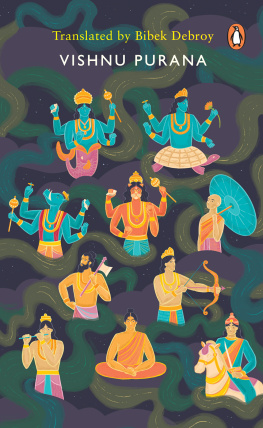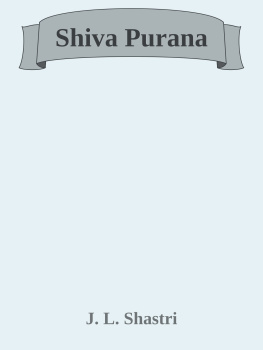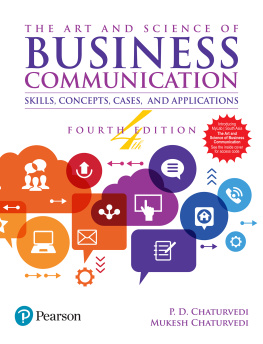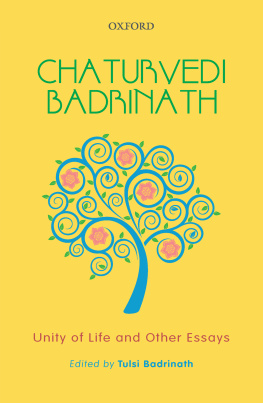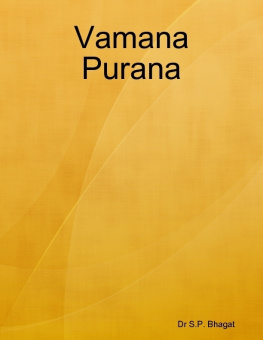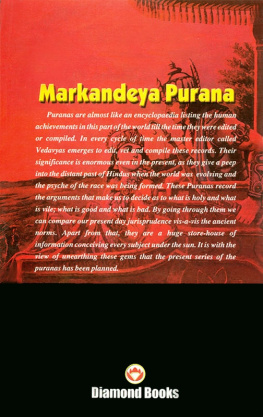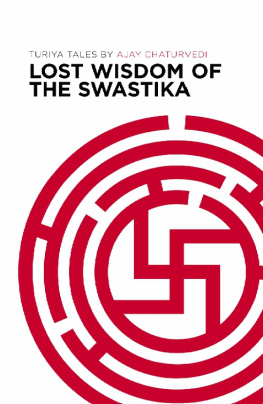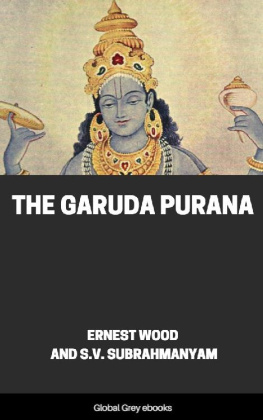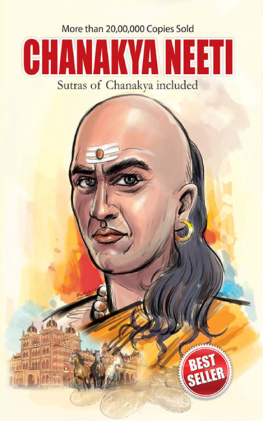B.K. Chaturvedi - Kalki Purana
Here you can read online B.K. Chaturvedi - Kalki Purana full text of the book (entire story) in english for free. Download pdf and epub, get meaning, cover and reviews about this ebook. publisher: Diamond Pocket Books (P) Ltd., genre: Religion. Description of the work, (preface) as well as reviews are available. Best literature library LitArk.com created for fans of good reading and offers a wide selection of genres:
Romance novel
Science fiction
Adventure
Detective
Science
History
Home and family
Prose
Art
Politics
Computer
Non-fiction
Religion
Business
Children
Humor
Choose a favorite category and find really read worthwhile books. Enjoy immersion in the world of imagination, feel the emotions of the characters or learn something new for yourself, make an fascinating discovery.
- Book:Kalki Purana
- Author:
- Publisher:Diamond Pocket Books (P) Ltd.
- Genre:
- Rating:3 / 5
- Favourites:Add to favourites
- Your mark:
- 60
- 1
- 2
- 3
- 4
- 5
Kalki Purana: summary, description and annotation
We offer to read an annotation, description, summary or preface (depends on what the author of the book "Kalki Purana" wrote himself). If you haven't found the necessary information about the book — write in the comments, we will try to find it.
Kalki Purana — read online for free the complete book (whole text) full work
Below is the text of the book, divided by pages. System saving the place of the last page read, allows you to conveniently read the book "Kalki Purana" online for free, without having to search again every time where you left off. Put a bookmark, and you can go to the page where you finished reading at any time.
Font size:
Interval:
Bookmark:

eISBN: 979-81-2881-958-1
Publisher
Publisher: Diamond Pocket Books (P) Ltd.
X-30, Okhla Industrial Area, Phase-II
New Delhi-110020
Phone: 011-40712100, 41611861
Fax: 011-41611866
E-mail: sales@dpb.in
Website: www.diamondbook.in
Edition: 2014
KALKI PURANA
By -B.K. Chaturvedi
Puranas literally mean something ancient and particularly they refer to the ancient records. In fact in the absence of the tradition of keeping historical records in a chronological order in ancient India, these Puranas emerge as important documents. They, in an allegorical manner, reveal the basic values that have been ingrained in a particular race or faith, apart from other social Indian details of the eras gone by. In every cycle of time, the Hindu Scriptures claim, there occurs a Vedavyas who edits, vets, compiles and even writes these Puranas with unbiased objectivity. Every one is not entitled to do this job. Vedavyas is supposed to be the most learned, experienced and enlightened person of the Age. As the name suggests the term Vedavyas itself means someone who is like a diameter if the entire knowledge i.e. Vedas are likened to a circle. This actually means the most learned person of the age. It could be more than one. In fact all the Puranas, the Mahabharata, Srimad Bhagwata etc. that are supposed to have been written by one Vedavyas may have been written or compiled by many Vedavyases and perhaps the last one, Krishna Dweipayana, may have been the last one to edit them. As the historical records claim apart from what Vedvyas (Krishna Dweipayana) might have done, the last time it was duly edited and compiled was in the 5th-6th A.D. under the Gupta Reign which is said to be the golden- age of the Indian history. It was perhaps then that the need was felt to write this Purana, called Kalki Purana. Hence the doubt about its authenticity as it is not listed in the standard eighteen Puranas, simply because it was not written by that Vedavyas as it was composed much later. Nevertheless it also reveals the determination of the faith to strengthen its psychological composure at a period when attacks from the alien forces had restarted, almost a millennium after Alexanders invasion. Moreover, as the text itself suggests it must have been written when the Buddhist rulers were in power and the Mlechcha invasions had started taking place. Hence the repeated reference of the two groups of the people described as adversary.
Nevertheless, Kalki Purana, though it is one of the Upapuranas has its own importance. Although according to the Mahabharat, incarnation of Kalki is yet to take place, this Upapurana describes his doing in the past tense. Also, by certain description of Lord Kalki, it is apparent that it has borrowed heavily from Vishnu-Purana and the Srimad Bhagwata Purana. At times the description of the story of Lord Kalkis marriage with the princess of Srihala Dweep, Padma, throws the images also conjured up in the Medieval Hindi epic Padamavata by Malik Mohammad Jayasi. May be the latter was influenced by this Purana. But that clearly reveals that this Kalki Upapurana did exist in and around 14th century A.D. when Jayasi wrote his above-mentioned magnum opus.
It has been the endeavour to keep the narration interesting. Hence some of the prayers, ovations or hymns have been included in the essence-translation form.
Lastly, the compiler is very grateful to Sri Narendra Kumar of Diamond Pocket Books for allowing him to do this work freely and rationally.
B.K. Chaturvedi
Lord Kalki
Long ago Sootaji (an authority on the narration of the mythological tales and stories), engaged in deep worship of Lord Vishnu, Lord Supreme, adorable by all the deities and seers, said in feelingful voice: O Lord! I reverence thee with all my heart and mind. You are called Nara-Narayan, whose mere frown is enough to incinerate all the iniquitous tyrants and reveal the reality through his own illusive creation - the Maya; whose benign glance is just enough to grant the worshipper the best nook in all the top realms. You appear on the earth in a variety of forms to set right the order of propriety. May you incarnate yourself again in the form of Kalki to ensure welfare of every being of this world.
When Shaunak and other holy sages saw Sootaji so deeply involved in the worship of Lord Hari in the holy region of Nemisharanya, they asked him: O best of the seers! You are well aware of all the just nuances of the Dharma, a great scholar and omniscient by the grace of Lord Hari. Please tell us in detail as to what would cause Lord Vishnu to appear in the form of Kalki incarnation. Who is this Kalki? Where would he be born and how would he triumph over the disturbances then agitating the earth? How would he come to rule over the entire earth? What sort of penances and strict disciplines that one should observe to get to that envisaged status? What would be those factors that would cause the decay in the moral values and give rise to the downright immoral traits? Please satisfy our ardent curiosity and describe in detail about Kalki incarnation of Lord Vishnu.
Hearing this query from the holy sages and realising their ardent curiosity for learning about the Kalki incarnation, Soota first concentrated his mind on Lord Hari and getting enthralled by this remembrance and the Lords grace he thus addressed the sages: O high sages! Listen! I tell you in detail about Kalki incarnation. Very long ago once the Veena-player, Naradji, had asked Brahmaji about this wondrous story. Whatever Narad heard about it from Brahma was communicated by him to my exalted guru (mentor) Shree Vedavyasji. Vedavyasji told about it to his very precocious child Brahmaratra (Shukadeva) who narrated it to Abhimanyus son Vishnuraata (Parikshit) at the conclusion of the great battle of Mahabharat. The holy discourse continued for about a week. The narrator and the listener both obtained salvation by the grace of the holy tale. This story was again retold by Sage Markandeya and Shukadeva when other high sages expressed their curiosity to learn about it. This holy tale, which is about to happen in future, was abridged by Shukadeva for its easier comprehension. Now detecting your unflinching faith and ardent curiosity I recite it again to you. Since you all are most deserving listeners, you must hear it with rapt attention. (Then Sootaji narrated this story).
When Lord Krishna, deeming the end of the Dwapar to be nigh and all his duties completed felt relieved, he left for the sea-shore where, according to the divine scheme, he was hit by a fowlers arrow in the sole of his feet. Kalki Avataar (Incarnation) was supposed to have taken place after Lord Krishna (Vishnus) return to his Exalted Realm, Vaikuntha. Now listen to the main story:
When the period of Pralaya was over and Brahma thought of starting the process of creation, he created a deadly dark affliction from his back. This affliction is called Maleen Pataka that bred the world-destroying being called Kali (Kaliyuga)
Right at the time of his birth Kali carried an Upaasthi (a small bone) and his entire body complexion was sooty and dark. This huge-being, with a terrible tongue and an obnoxious smell about his entire physique, chose gambling, liquor, woman and gold as his permanent abodes. Meanwhile, Krodh and Himsa also produced a horrible daughter who was as horrendous as Kali had been. She established union with Kali to produce deadly son called Bhayanak and a daughter called Mrityu (death). Bhayanaka established union with Mrityu to produce a son called Niraya and a daughter called Yatana (torture) This way Maleen Pataka, produced by Brahmas back, had a horrible lineage which produced illimitable progeny. All of their descendants were highly immoral, iniquitious, encourager of the vile tendencies, indifferent or hostile to the gods and a positive nuisance to all those intending to tread the righteous path. They created such a havoc in the world that people began to yell for getting succour from the divine powers.
Font size:
Interval:
Bookmark:
Similar books «Kalki Purana»
Look at similar books to Kalki Purana. We have selected literature similar in name and meaning in the hope of providing readers with more options to find new, interesting, not yet read works.
Discussion, reviews of the book Kalki Purana and just readers' own opinions. Leave your comments, write what you think about the work, its meaning or the main characters. Specify what exactly you liked and what you didn't like, and why you think so.

